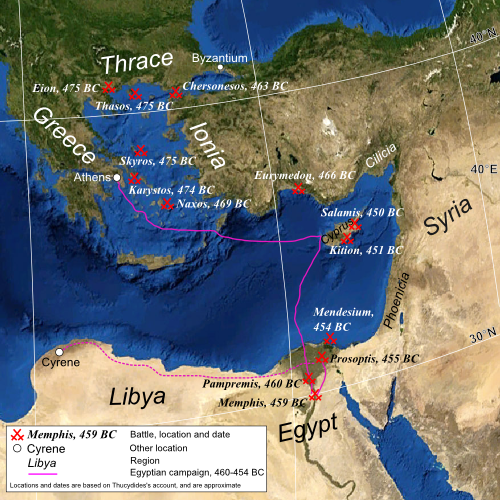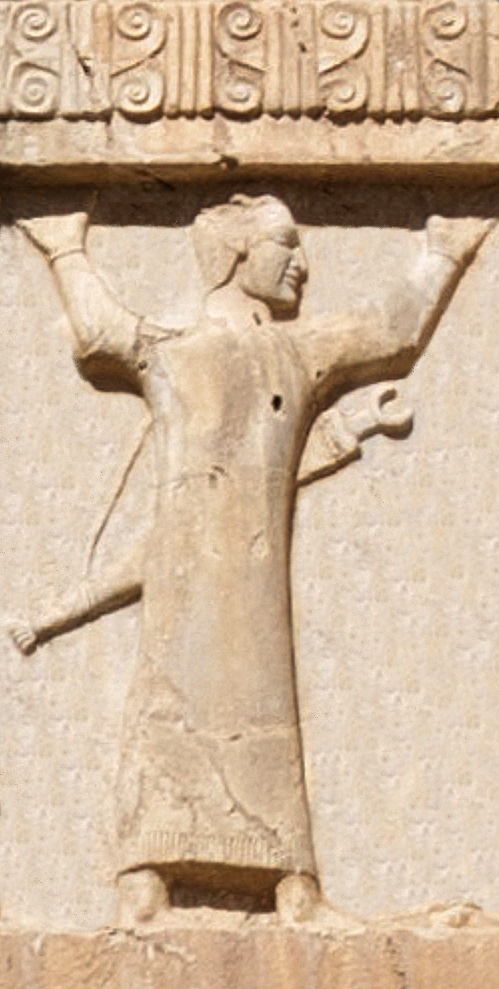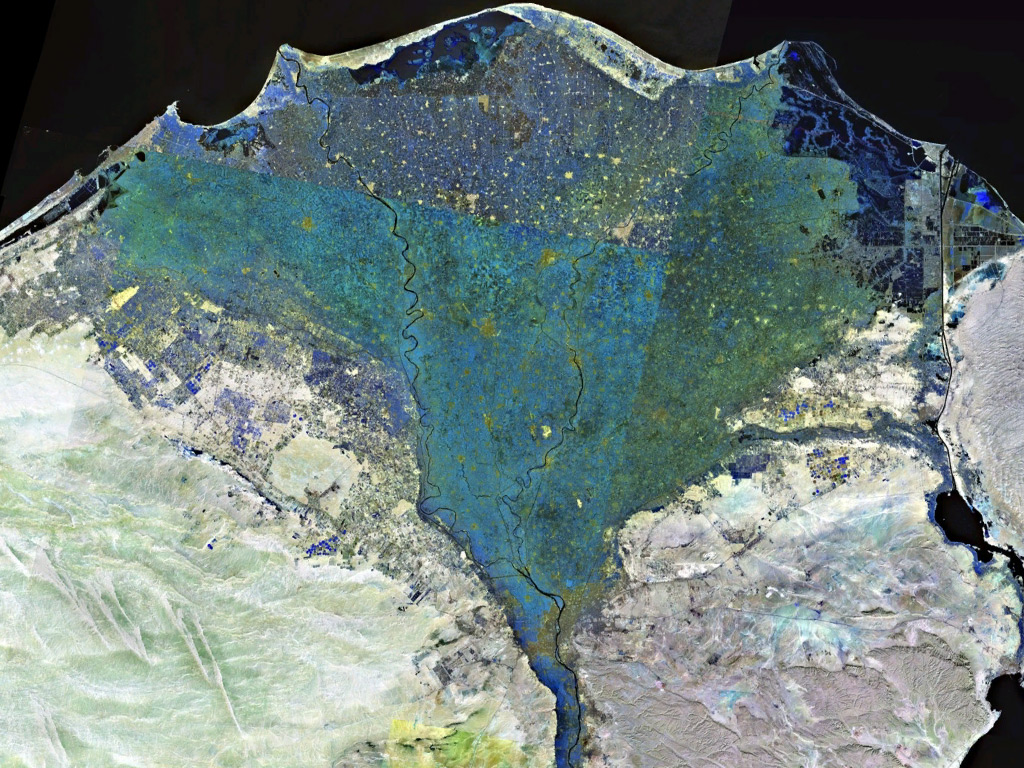|
Inarus
Inaros (II), also known as Inarus, (fl. 460 BC) was an Egyptian rebel ruler who was the son of an Egyptian prince named Psamtik, presumably of the old Saite line, and grandson of Psamtik III. In 460 BC, he revolted against the Persians with the help of his Athenian allies under Admiral Charitimides, and defeated the Persian army commanded by satrap Achaemenes. The Persians retreated to Memphis, but the Athenians were finally defeated in 454 BC by the Persian army led by Megabyzus, satrap of Syria, and Artabazus, satrap of Phrygia, after a two-year siege. Inaros was captured and carried away to Susa where he was reportedly crucified in 454 BC. Revolt and aftermath He held a kingship over the Libyans from Mareia (above Pharos) and the part of the Nile Delta around Sais. With help from Amyrtaeus, also from Sais, who took the northern marshes, Inarus drove out the tax-collectors while collecting mercenaries. These actions started a revolt in Egypt at the beginning of the r ... [...More Info...] [...Related Items...] OR: [Wikipedia] [Google] [Baidu] |
Artabazos I Of Phrygia
Artabazos (; 480 BC - 455 BC) was a Persian people, Persian general in the army of Xerxes I, and later satrap of Hellespontine Phrygia (now northwest Turkey) under the Achaemenid dynasty, founder of the Pharnacid dynasty of satraps. He was the son of Pharnaces (son of Arsames), Pharnaces, who was the younger brother of Hystaspes (father of Darius I), Hystaspes, father of Darius I. Artabazos was therefore a first cousin of the great Achaemenid ruler Darius I. General in the Second Persian invasion of Greece Artabazus was one of the generals of Xerxes I, Xerxes in the 480 BC Second Persian invasion of Greece, in command of the Parthians and the Chorasmians in the Achaemenid army. He was particularly in charge of the reserve forces guarding the route back to Asia, and responsible for suppressing a revolt in Potidaea. The invasion ended the following year with the commander-in-chief Mardonius (general), Mardonius, ignoring advice from Artabazus and others, meeting the Gree ... [...More Info...] [...Related Items...] OR: [Wikipedia] [Google] [Baidu] |
Megabyzus
Megabyzus (, a folk-etymological alteration of Old Persian Bagabuxša, meaning "God saved") was an Achaemenid Persian general, son of Zopyrus, satrap of Babylonia, and grandson of Megabyzus I, one of the seven conspirators who had put Darius I on the throne. His father was killed when the satrapy rebelled in 484 BCE, and Megabyzus led the forces that recaptured the city, after which the statue of the god Marduk was destroyed to prevent future revolts. Megabyzus subsequently took part in the Second Persian invasion of Greece (480–479 BCE). Herodotus claims that he refused to act on orders to pillage Delphi, but it is doubtful such orders were ever given. Conspiracy of Artabanes According to Ctesias, who is not especially reliable but is often our only source, Amytis, wife of Megabyzus and daughter of Xerxes, was accused of adultery shortly afterwards. As such, Megabyzus took part in the conspiracy of Artabanus to assassinate the emperor, but betrayed him before he could ... [...More Info...] [...Related Items...] OR: [Wikipedia] [Google] [Baidu] |
Zvenigorodsky Seal
The Zvenigorodsky seal, also known as the "Persian king and the defeated enemies", is an Achaemenid empire, Achaemenid cylinder seal made from chalcedony. It is dated to the late 5th to the early 4th century Common Era, BCE. In 1930, the Hermitage Museum in Saint Petersburg obtained the seal from a private owner in Kerch (inventory number Гл-501). The seal was first documented in 1881 in ''Compte rendu de la Commission Impériale Archéologique pour l'Année''. Content The cylinder depicts an Achaemenid King of Kings subjugating a captive who is wearing a Pschent, ''pschent'' ( an Egyptians, Egyptian double crown). The captive is seen kneeling, held down by the king's hand and in his other hand, a spear. Behind the king there are four prisoners with a rope around their necks, the rope being held by the king. The garments worn by the prisoners are similar to those worn by Egyptian figures in the reliefs of Naqsh-e Rostam. The features suggest the conquest of Ancient Egypt or the s ... [...More Info...] [...Related Items...] OR: [Wikipedia] [Google] [Baidu] |
Artaxerxes I
Artaxerxes I (, ; ) was the fifth King of Kings of the Achaemenid Empire, from 465 to December 424 BC. He was the third son of Xerxes I. In Greek sources he is also surnamed "Long-handed" ( ''Makrókheir''; ), allegedly because his right hand was longer than his left. Josephus, and several ancient traditions identify him as Ahasuerus#Identification of "Ahasuerus" as Artaxerxes I, King Ahasuerus, from the Book of Esther. Succession to the throne Artaxerxes was probably born in the reign of his grandfather Darius I, to the emperor's son and heir, Xerxes I. In 465 BC, Xerxes I was murdered by ''Hazarapat'' ("commander of thousand") Artabanus of Persia, Artabanus, the commander of the royal bodyguard and the most powerful official in the Persian court, with the help of a eunuch, Aspamitres. Greek historians give contradicting accounts of events. According to Ctesias (in ''Persica'' 20), Artabanus then accused Darius (son of Xerxes I), Crown Prince Darius, Xerxes's eldest ... [...More Info...] [...Related Items...] OR: [Wikipedia] [Google] [Baidu] |
Athenian
Athens ( ) is the Capital city, capital and List of cities and towns in Greece, largest city of Greece. A significant coastal urban area in the Mediterranean, Athens is also the capital of the Attica (region), Attica region and is the southernmost capital on the European mainland. With its urban area's population numbering over 3.6 million, it is the List of urban areas in the European Union, eighth-largest urban area in the European Union (EU). The Municipality of Athens (also City of Athens), which constitutes a small administrative unit of the entire urban area, had a population of 643,452 (2021) within its official limits, and a land area of . Athens is one of the List of oldest continuously inhabited cities, world's oldest cities, with its recorded history spanning over 3,400 years, and its earliest human presence beginning somewhere between the 11th and 7th millennia BCE. According to Greek mythology the city was named after Athena, the ancient Greek goddess of wisdom, ... [...More Info...] [...Related Items...] OR: [Wikipedia] [Google] [Baidu] |
Xerxes I Tomb Libyan Soldier Circa 480 BCE
Xerxes ( ) may refer to: People * Xerxes I of Persia, "Xerxes the Great", reigned 486–465 BC * Xerxes II of Persia, briefly reigned 424 BC * Xerxes of Sophene, ruler of Sophene and Commagene, 228–201 BC * Xerxes (Sasanian prince), 6th-century prince and general * Xerxes (name), a list of people with the name Fiction, stage and video *'' Il Xerse'' (''Xerxès'' in its 1660 French version), a 1654 opera by Francesco Cavalli * ''Xerse'' (Bononcini), a 1694 opera by Giovanni Bononcini *''Serse'' (''Xerxes''), a 1738 opera by George Frideric Handel *''Xerxes'', a 1919 novel by Louis Couperus * ''Xerxes'' (TV series), a 1988 Swedish TV series about young adults * ''Xerxes'' (graphic novel), a 2018 graphic novel by Frank Miller Other *Xerxes Peak, a mountain in the Canadian Rockies *XerxesDZB, a Dutch professional football team based in Rotterdam *Roksan Xerxes, a series of record turntables from Roksan Audio (UK) *XerXeS, a denial-of-service attack tool developed by The Jester * X ... [...More Info...] [...Related Items...] OR: [Wikipedia] [Google] [Baidu] |
Richard Crawley
Richard Crawley (26 December 1840 – 30 March 1893) was a Welsh writer and academic, best known for his translation of Thucydides's ''History of the Peloponnesian War''. Life Crawley was born at a Bryngwyn rectory on 26 December 1840, the eldest son of William Crawley, Archdeacon of Monmouth, by his wife, Mary Gertrude, third daughter of Sir Love Jones Parry of Madryn, Carnarvonshire. From 1851 to 1861 he was at Marlborough College. He matriculated at University College, Oxford, as an exhibitioner on 22 May 1861, and graduated with a B.A. in 1866, having taken a first class both in moderations and in the school of Literae Humaniores. In 1866, he was elected to a fellowship at Worcester College, Oxford, which he held till 1880. Called to the bar at Lincoln's Inn on 7 June 1869, Crawley never practised; in poor health, he lived abroad for many years. In April 1875, he became director of a life assurance company, and that business largely occupied him until his death ... [...More Info...] [...Related Items...] OR: [Wikipedia] [Google] [Baidu] |
Trie
In computer science, a trie (, ), also known as a digital tree or prefix tree, is a specialized search tree data structure used to store and retrieve strings from a dictionary or set. Unlike a binary search tree, nodes in a trie do not store their associated key. Instead, each node's ''position'' within the trie determines its associated key, with the connections between nodes defined by individual Character (computing), characters rather than the entire key. Tries are particularly effective for tasks such as autocomplete, spell checking, and IP routing, offering advantages over hash tables due to their prefix-based organization and lack of hash collisions. Every child node shares a common prefix (computer science), prefix with its parent node, and the root node represents the empty string. While basic trie implementations can be memory-intensive, various optimization techniques such as compression and bitwise representations have been developed to improve their efficiency. A n ... [...More Info...] [...Related Items...] OR: [Wikipedia] [Google] [Baidu] |
Ancient Athens
Athens is one of the List of oldest continuously inhabited cities, oldest named cities in the world, having been continuously inhabited for perhaps 5,000 years. Situated in southern Europe, Athens became the leading city of ancient Greece in the first millennium BC, and its cultural achievements during the 5th century BC laid the foundations of Western world, Western civilization. The earliest evidence for human habitation in Athens dates back to the Neolithic period. The Acropolis of Athens, Acropolis served as a fortified center during the Mycenaean Greece, Mycenaean era. By the 8th century BC, Athens had evolved into a prominent city-state, or Polis, ''polis'', within the region of Attica. The 7th and 6th centuries BC saw the establishment of legal codes, such as those by Draco (legislator), Draco, Solon and Cleisthenes, which aimed to address social inequalities and set the stage for the development of democracy. In the early 5th century BC, Athens played a central role in ... [...More Info...] [...Related Items...] OR: [Wikipedia] [Google] [Baidu] |
Xerxes I
Xerxes I ( – August 465 BC), commonly known as Xerxes the Great, was a List of monarchs of Persia, Persian ruler who served as the fourth King of Kings of the Achaemenid Empire, reigning from 486 BC until his assassination in 465 BC. He was the son of Darius the Great and Atossa, a daughter of Cyrus the Great. In Western history, Xerxes is best known for his Second Persian invasion of Greece, invasion of Greece in 480 BC, which ended in Persian defeat. Xerxes was designated successor by Darius over his elder brother Artobazan and inherited a large, multi-ethnic empire upon his father's death. He consolidated his power by crushing revolts in Twenty-seventh Dynasty of Egypt, Egypt and Babylonian revolts (484 BC), Babylon, and renewed his father's campaign to subjugate Ancient Greece, Greece and punish Classical Athens, Athens and its allies for their interference in the Ionian Revolt. In 480 BC, Xerxes personally led a large army and crossed the Dardanelles, Hellespont into Eu ... [...More Info...] [...Related Items...] OR: [Wikipedia] [Google] [Baidu] |
Sais
Sais (, ) was an ancient Egyptian city in the Western Nile Delta on the Canopic branch of the Nile,Mish, Frederick C., Editor in Chief. "Saïs." '' Webster's Ninth New Collegiate Dictionary''. 9th ed. Springfield, MA: Merriam-Webster Inc., 1985. , (indexed), and (deluxe). known by the ancient Egyptians as Sꜣw. It was the provincial capital of Sap-Meh, the fifth nome of Lower Egypt and became the seat of power during the Twenty-fourth Dynasty of Egypt (–720 BC) and the Saite Twenty-sixth Dynasty of Egypt (664–525 BC) during the Late Period.Ian Shaw & Paul Nicholson, The Dictionary of Ancient Egypt, British Museum Press, 1995. p.250 On its ruins today stands the town of Sa el-Hagar () or Sa El Hajar. Neolithic period A Neolithic settlement has been identified at Sais recently (1999), dating to 5000 BC. Agriculture appears here during this period, as well as at another similar site, Merimde Beni Salama, which is located about 80km south of Sais. The Neolithic pe ... [...More Info...] [...Related Items...] OR: [Wikipedia] [Google] [Baidu] |
Nile Delta
The Nile Delta (, or simply , ) is the River delta, delta formed in Lower Egypt where the Nile River spreads out and drains into the Mediterranean Sea. It is one of the world's larger deltas—from Alexandria in the west to Port Said in the east; it covers of the Mediterranean coastline and is a rich agricultural region. From north to south the delta is approximately in length. The Delta begins slightly down-river from Cairo. Geography From north to south, the delta is approximately in length. From west to east, it covers some of coastline. The delta is sometimes divided into sections, with the Nile dividing into two main distributary, distributaries, the Damietta and the Rosetta, flowing into the Mediterranean at port cities with the same names. In the past, the delta had several distributaries, but these have been lost due to flood management, flood control, silting and changing relief. One such defunct distributary is Wadi Tumilat. The Suez Canal is east of the delta ... [...More Info...] [...Related Items...] OR: [Wikipedia] [Google] [Baidu] |








